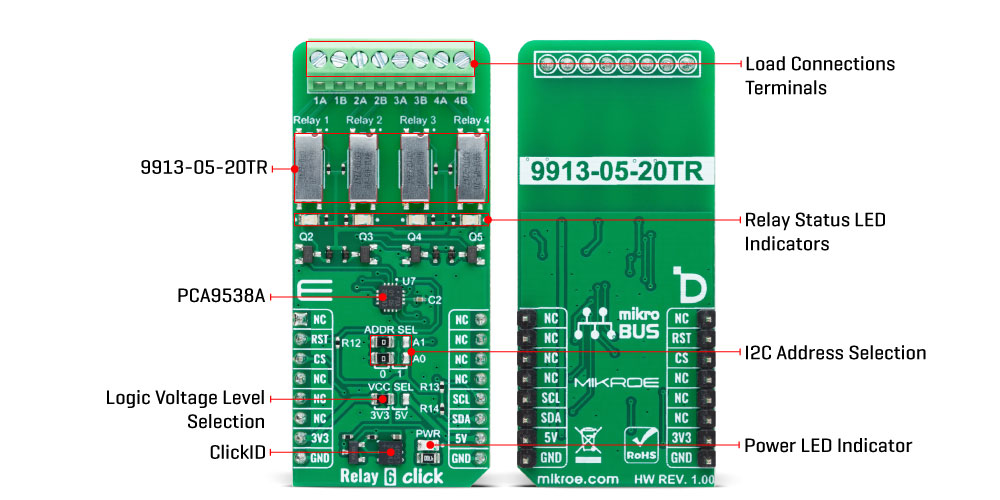20%
OFF
GO LOCAL
| Company | Stock | Price |
|---|---|---|

MIKROE-6001
22 g
Status:
Relay 6 Click is a compact add-on board for precise load control and monitoring applications. This board features four 9913-05-20TRs, a reed relay from Coto Technology, well-known for its ultra-miniature SMD design, which offers the smallest footprint in the market. These four relays each have four load connection terminals and blue LED indicators that signal the operational status, ensuring clear and immediate feedback. The relays offer high reliability, with hermetically sealed contacts, over 1011Ω insulation resistance, and an external magnetic shield. They support a coil voltage of 5VDC and switching capabilities up to 100VDC. It is ideally suited for automated test equipment, instrumentation, and telecommunications.
Relay 6 Click is fully compatible with the mikroBUS™ socket and can be used on any host system supporting the mikroBUS™ standard. It comes with the mikroSDK open-source libraries, offering unparalleled flexibility for evaluation and customization. What sets this Click board™ apart is the groundbreaking ClickID feature, enabling your host system to seamlessly and automatically detect and identify this add-on board.
This product is no longer in stock
Availability date:
20%
OFF
| Company | Stock | Price |
|---|---|---|

Relay 6 Click is based on the 9913-05-20TR, a reed relay from Coto Technology, a component known for its ultra-miniature SMD design, standing for the smallest footprint in the market. This Click board™ features four relays, each equipped with four terminals for load connections that are controlled via these relays. Beneath each relay is a blue LED indicator that illuminates to signal when the relay is active, serving as an operational status indicator. This setup provides clear and immediate feedback on the status of each relay, enhancing user control and system monitoring. This Click board™ is ideal for automated test equipment, instrumentation, and telecommunications applications, highlighting high reliability and long life due to relays hermetically sealed contacts.

The 9913-05-20TRs also feature a high insulation resistance of a minimum of 1011Ω and an external magnetic shield. Its electrical specifications include a coil voltage of 5VDC, a coil resistance of 200Ω, a single-pole single-throw normally open (SPST-NO, 1 Form A) contact form, with the contact current rating capped at 250mA and the switching voltage limited to 100VAC and 100VDC.
Control and communication between the relays and the host MCU are managed via the PCA9538A port expander, which uses an I2C communication interface. This device supports both Standard and Fast modes, with frequencies up to 400kHz. The PCA9538A's I2C address can be configured through the ADDR SEL jumpers, allowing flexible integration with various MCU systems.
The PCA9538A also uses an RST pin that ensures the registers and I2C-bus state machine remain in their default settings until this pin is set to a HIGH logic state, where the device returns to normal operational status.
This Click board™ can operate with either 3.3V or 5V logic voltage levels selected via the VCC SEL jumper. This way, both 3.3V and 5V capable MCUs can use the communication lines properly. Also, this Click board™ comes equipped with a library containing easy-to-use functions and an example code that can be used as a reference for further development.
Type
Relay
Applications
Ideal for automated test equipment, instrumentation, and telecommunications
On-board modules
9913-05-20TR - reed relay from Coto Technology
Key Features
Ultra-miniature SMD reed relay,high reliability, high insulation resistance, external magnetic shield, switching voltage up to 100VAC/VDC, I2C interface with selectable address, reset feature, blue LED indicators for relay operational status, and more
Interface
I2C
Feature
ClickID
Compatibility
mikroBUS™
Click board size
L (57.15 x 25.4 mm)
Input Voltage
3.3V or 5V
This table shows how the pinout on Relay 6 Click corresponds to the pinout on the mikroBUS™ socket (the latter shown in the two middle columns).
| Label | Name | Default | Description |
|---|---|---|---|
| LD1 | PWR | - | Power LED Indicator |
| LD2-LD5 | PWR | - | Relay Status LED Indicators |
| JP1 | VCC SEL | Left | Logic Voltage Level Selection 3V3/5V: Left position 3V3, Right position 5V |
| JP2-JP3 | ADDR SEL | Left | I2C Address Selection 0/1: Left position 0, Right position 1 |
| Description | Min | Typ | Max | Unit |
|---|---|---|---|---|
| Supply Voltage | 3.3 | - | 5 | V |
| Switching Voltage | - | - | 100 | VDC/AC |
| Contact Current | - | - | 250 | mA |
We provide a library for the Relay 6 Click as well as a demo application (example), developed using MIKROE compilers. The demo can run on all the main MIKROE development boards.
Package can be downloaded/installed directly from NECTO Studio Package Manager(recommended), downloaded from our LibStock™ or found on Mikroe github account.
Library Description
This library contains API for Relay 6 Click driver.
Key functions
relay6_reset_port_expander Relay 6 reset port expander function.
relay6_port_expander_write Relay 6 port expander write register function.
relay6_set_relay Relay 6 set relay state function.
Example Description
This example demonstrates the use of Relay 6 click board by toggling the relays state.
void application_task ( void )
{
uint8_t relay_data;
relay_data = RELAY6_RELAY1_PIN;
log_printf( &logger, " Turning on only Relay 1 rn" );
log_printf( &logger, " = = = = = = = = = = = = = rn" );
relay6_set_relay( &relay6, relay_data, ~relay_data );
relay_data <<= 1;
Delay_ms( 1000 );
log_printf( &logger, " Turning on only Relay 2 rn" );
log_printf( &logger, " = = = = = = = = = = = = = rn" );
relay6_set_relay( &relay6, relay_data, ~relay_data );
relay_data <<= 1;
Delay_ms( 1000 );
log_printf( &logger, " Turning on only Relay 3 rn" );
log_printf( &logger, " = = = = = = = = = = = = = rn" );
relay6_set_relay( &relay6, relay_data, ~relay_data );
relay_data <<= 1;
Delay_ms( 1000 );
log_printf( &logger, " Turning on only Relay 4 rn" );
log_printf( &logger, " = = = = = = = = = = = = = rn" );
relay6_set_relay( &relay6, relay_data, ~relay_data );
relay_data <<= 1;
Delay_ms( 1000 );
}
The full application code, and ready to use projects can be installed directly from NECTO Studio Package Manager(recommended), downloaded from our LibStock™ or found on Mikroe github account.
Other Mikroe Libraries used in the example:
Additional notes and informations
Depending on the development board you are using, you may need USB UART click, USB UART 2 Click or RS232 Click to connect to your PC, for development systems with no UART to USB interface available on the board. UART terminal is available in all MIKROE compilers.
This Click board™ is supported with mikroSDK - MIKROE Software Development Kit. To ensure proper operation of mikroSDK compliant Click board™ demo applications, mikroSDK should be downloaded from the LibStock and installed for the compiler you are using.
For more information about mikroSDK, visit the official page.
NOTE: Please be advised that any peripheral devices or accessories shown connected to the Click board™ are not included in the package. Check their availability in our shop or in the YMAN section below.